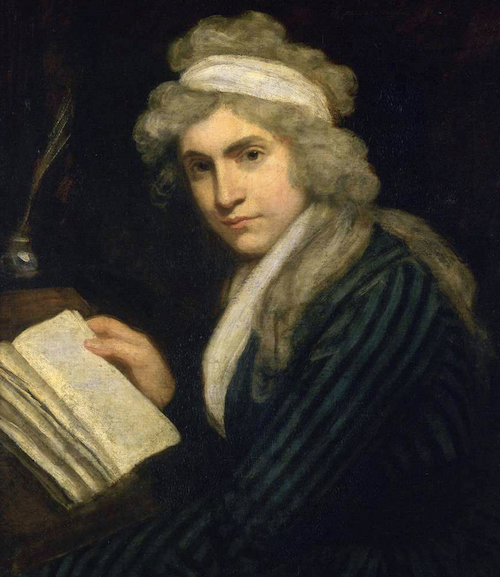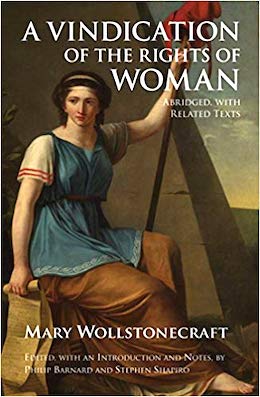Quotes from A Vindication of the Rights of Woman by Mary Wollstonecraft
By Aiyana Edmund | On October 13, 2018 | Updated July 11, 2019 | Comments (0)

One of the earliest works of feminist philosophical literature, A Vindication of the Rights of Woman: With Strictures on Political and Moral Subjects was written by Mary Wollstonecraft and published in 1792.
In this classic, Mary Wollstonecraft (not to be confused with her daughter, Mary Wollstonecraft Shelley, author of Frankenstein) argues for equality of men and women: Men and women are both born with equal ability to reason, and therefore power and influence should be available to all regardless of gender.
Wollstonecraft believed that regardless of wealth and social status, males and females should have the same educational opportunities. She sought radical reform of the 18th-century education system, believing that a society where females are offered the same opportunities as males would bring only beneficial change to the future of humanity.
More than two hundred years later, the struggle for gender equality continues, making bold feminist ideas as urgent as ever! Here’s a selection of empowering and radical quotes from A Vindication of the Rights of Woman for inspiration to keep fighting the good fight!
. . . . . . . . . .
“Soft phrases, susceptibility of heart, delicacy of sentiment, and refinement of taste are almost synonymous with the epithets of weakness…I wish to show that elegance is inferior to virtue.”
. . . . . . . . . .
“My own sex, I hope, will excuse me, if I treat them like rational creatures, instead of flattering their fascinating graces, and viewing them as if they were in a state of perpetual childhood, unable to stand alone.”
. . . . . . . . . .
“I do not wish them [women] to have power over men; but over themselves.”
. . . . . . . . . .
“Taught from their infancy that beauty is woman’s scepter, the mind shapes itself to the body, and roaming round its gilt cage, only seeks to adorn its prison.”
. . . . . . . . . .
Mary Wollstonecraft’s A Vindication of the Rights of Woman: An Appreciation
. . . . . . . . . .
“I love man as my fellow; but his scepter, real, or usurped, extends not to me, unless the reason of an individual demands my homage; and even then the submission is to reason, and not to man.”
. . . . . . . . . .
“I earnestly wish to point out in what true dignity and human happiness consists. I wish to persuade women to endeavor to acquire strength, both of mind and body, and to convince them that the soft phrases, susceptibility of heart, delicacy of sentiment, and refinement of taste, are almost synonymous with epithets of weakness, and that those beings are only the objects of pity, and that kind of love which has been termed its sister, will soon become objects of contempt.”
. . . . . . . . . .
“But women are very differently situated with respect to each other – for they are all rivals (…) Is it then surprising that when the sole ambition of woman centres in beauty, and interest gives vanity additional force, perpetual rivalships should ensue? They are all running the same race, and would rise above the virtue of morals, if they did not view each other with a suspicious and even envious eye.”
. . . . . . . . . .
“Love from its very nature must be transitory. To seek for a secret that would render it constant would be as wild a search as for the philosopher’s stone or the grand panacea: and the discovery would be equally useless, or rather pernicious to mankind. The most holy band of society is friendship.”
. . . . . . . . . .
“The man who can be contented to live with a pretty and useful companion who has no mind has lost in voluptuous gratifications a taste for more refined pleasures; he has never felt the calm and refreshing satisfaction . . . of being loved by someone who could understand him.”
. . . . . . . . . .
Public domain eBook of A Vindication of the Rights of Woman
. . . . . . . . . .
“For any kind of reading I think better than leaving a blank still a blank, because the mind must receive a degree of enlargement and obtain a little strength by a slight exertion of its thinking powers; besides, even the productions that are only addressed to the imagination, raise the reader a little above the gross gratification of appetites, to which the mind has not given a shade of delicacy.”
. . . . . . . . . .
“And, perhaps, in the education of both sexes, the most difficult task is so to adjust instruction as not to narrow the understanding, whilst the heart is warmed by the generous juices of spring . . . nor to dry up the feelings by employing the mind in investigations remote from life.”
. . . . . . . . . .
“All the sacred rights of humanity are violated by insisting on blind obedience.”
. . . . . . . . . .

. . . . . . . . . .
“It is justice, not charity, that is wanting in the world!”
. . . . . . . . . .
“Yet women, whose minds are not enlarged by cultivation, or in whom the natural selfishness of sensibility hasn’t been expanded by reflection, are very unfit to manage a family, because they always stretch their power and use tyranny to maintain a superiority that rests on nothing but the arbitrary distinction of fortune.”
. . . . . . . . . .
“It is easier to list modes of behaviour that are required or forbidden than to set reason to work; but once the mind has been stored with useful knowledge and strengthened by being used, the regulation of the behaviour may safely be left to its guidance without the aid of formal rules.”
. . . . . . . . . .
“Taxes on the very necessaries of life, enable an endless tribe of idle princes and princesses to pass with stupid pomp before a gaping crowd, who almost worship the very parade which costs them so dear.”
. . . . . . . . . .
“Happy would it be for women, if they were only flattered by the men who loved them; I mean, who love the individual, not the sex.”
. . . . . . . . . .
A Vindication of the Rights of Woman on Amazon
. . . . . . . . . .
“And having no fear of the devil before my eyes, I venture to call this a suggestion of reason, instead of resting my weakness on the broad shoulders of the first seducer of my frail sex.”
. . . . . . . . . .
“It is far better to be often deceived than never to trust; to be disappointed in love, than never to love.”
. . . . . . . . . .
“Consequently, the most perfect education, in my opinion, is such an exercise of the understanding as is best calculated to strengthen the body and form the heart; or, in other words, to enable the individual to attain such habits of virtue as will render it independent. In fact, it is a farce to call any being virtuous whose virtues do not result from the exercise of its own reason.”
. . . . . . . . . .
“Women are told from their infancy, and taught by the example of their mothers, that a little knowledge of human weakness, justly termed cunning, softness of temper, outward obedience, and a scrupulous attention to a puerile kind of propriety, will obtain for them the protection of man; and should they be beautiful, every thing else is needless, for, at least, twenty years of their lives.”
. . . . . . . . . .
“So ludicrous, in fact, do these ceremonies appear to me, that I scarcely am able to govern my muscles, when I see a man start with eager, and serious solicitude to lift a handkerchief, or shut a door, when the LADY could have done it herself, had she only moved a pace or two.”
. . . . . . . . . .
“It appears necessary to go back to first principles in search of the most simple truths, and to dispute with some prevailing prejudice every inch of ground.”
. . . . . . . . . .
“Men, indeed, appear to me to act in a very unphilosophical manner when they try to secure the good conduct of women by attempting to keep them always in a state of childhood.”
. . . . . . . . . .

Learn more about Mary Wollstonecraft



Leave a Reply